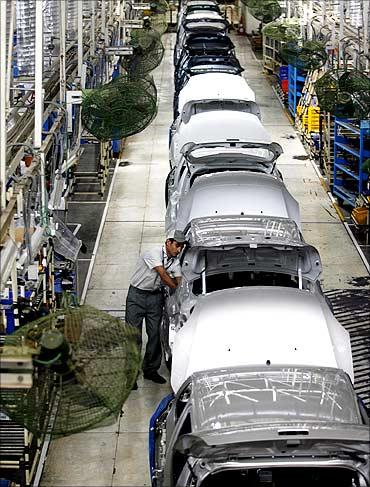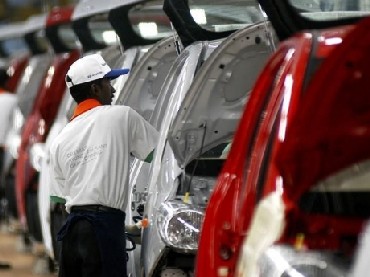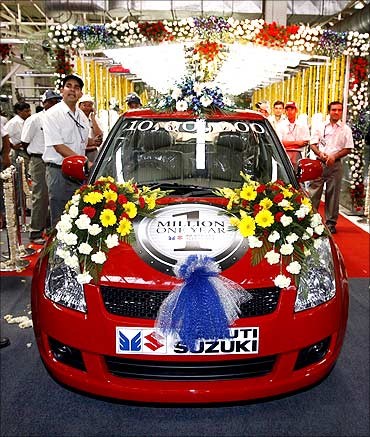Photographs: Reuters Shyamal Majumdar
The management of Maruti Suzuki may have every reason to feel miffed with workers at the Manesar plant since they have hit the company when it hurts the most.
The latest standoff comes at a time when India's largest car-maker has just launched an upgraded model of the Swift ahead of the festive season.
Also, it's just about two months since a 13-day strike at the plant crippled production, as a result of which Maruti lost 12,600 cars valued at about Rs 630 crore (Rs 6.30 billion).
. . .
BOND problem: Why Maruti needs a political solution
Photographs: Reuters
But it's debatable whether the management's insistence that all workers must sign a 'good conduct bond' is the ideal way of solving the crisis.
The bond says workers would follow discipline, not get involved in absenteeism, not resort to go-slow tactics, follow the production principle and not sabotage production or indulge in activities that may hamper normal production.
But let's look at the legality. Schedule 5 of the Industrial Disputes Act says 'to insist upon individual workmen, who are on a legal strike to sign a good conduct bond, as a pre-condition to allowing them to resume work is an unfair labour practice'.
. . .
BOND problem: Why Maruti needs a political solution
Photographs: Reuters
What could queer the management's pitch further is the fact that the workers at the Manesar plant have not called a strike -- illegal or otherwise.
The Maruti management says tough action (which includes suspending 16 workers and dismissing 12 technician trainees) was warranted because workers were sabotaging production and deliberately causing quality problems in the vehicles produced at the plant last week and that the situation has reached a stage at which it was directly harming customers' interest and trust.
The company has since sealed its premises.
. . .
BOND problem: Why Maruti needs a political solution
Photographs: Reuters
The quality issues are undoubtedly grave: several vehicle doors fell off on the assembly line because they were not properly clamped, wiring harnesses had cuts, bodies had dents and critical components were improperly fitted.
Between August 23 and 25, Manesar was supposed to produce 3,700 units. The actual production was around 1,570 units. Of that, only 969 units received quality clearance, that is only 62 per cent cars produced.
There is no quarrel with the fact that these are serious charges, but where the company has probably erred is in thinking that 'behaviour bonds' will solve the problem.
. . .
BOND problem: Why Maruti needs a political solution
Photographs: Reuters
In the past, such attempts have been held to be an act of 'force' and 'coercion' by the courts.
It was no surprise, therefore, that the trade unions were quick to point out the illegality of the lockout and the conduct bond.
The New Trade Union Initiative (NTUI) has pounced on the management by saying Maruti has failed to disclose its actions as required by the Companies Act, 1956 and other related legislation.
. . .
BOND problem: Why Maruti needs a political solution
Photographs: Reuters
Until the end of the working day, the management had made no disclosure including to the stock exchanges, which 'companies are duty bound to make and was thereby intentionally sought to keep away from the markets, what is in every sense of the term, price sensitive information', the union has said.
Some of these allegations are huge exaggerations, but the Maruti management could have handled the problem with more care and better HR planning.
For example, it is strange that the company is openly talking about resuming production in the Manesar plant with the help of 200 ITI-trained people who will be employed on a contract basis.
. . .
BOND problem: Why Maruti needs a political solution
Photographs: Reuters
It is also ironic that the management is banking on fresh contract workers to restart operations in the plant, given the fact that one of the main demands of the unions during the strike in June was permanent absorption of contract workers.
Maruti's Manesar factory already has a total of 2,500 workers, of which 40 per cent are contract or temporary workers.
These workers are now becoming aware of their rights and want at least the same working conditions and social security benefits as regular workers.
. . .
BOND problem: Why Maruti needs a political solution
Photographs: Reuters
The hard reality is that Maruti's is nothing but a political crisis and no amount of one-upmanship by the management or the unions will help resolve the issue.
The Haryana government has so far insisted that the Maruti labour problem is nothing more than a political conspiracy by the Left parties to incite industrial unrest in the state.
That may be true, considering that one of the major unions has been seeking affiliation with the All India Trade Union Congress, affiliated to the Communist Party of India.
. . .
BOND problem: Why Maruti needs a political solution
Photographs: Reuters
So finally, there has to be a political settlement of the issue. 'Good conduct bonds' and using contract labour can hardly be long-term solutions for Maruti's labour pain.
According to market research firm J D Power, the Indian auto industry already lacks as many as 300,000 skilled workers.
And in labour market efficiency, India ranks 92nd among 139 nations in the World Economic Forum's Global Competitiveness Index 2010-11.
Politicking over cases such as Maruti will only speed up the slide towards rank 139.











article